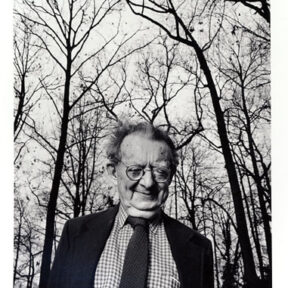
I.F. Stone
: Photo from Creative Commons / Author of Photo: Burnt PixelOverview
* Communist author and journalist
* Critic of the Vietnam and Korean Wars
* Believed to have had routine contact with members of the KGB
* Died on June 18, 1989
Once described as “the KGB’s front man in American journalism,” I.F. Stone was a radical journalist known predominantly for his rants against the Vietnam and Korean Wars, and for his leftwing newsletter, I.F. Stone’s Weekly.
Stone was born Isidor Feinstein in Philadelphia on December 24, 1907, to Jewish parents who had immigrated to the U.S. from Russia. This ancestral link to what would become the Soviet Union helped shape Stone’s journalistic pursuits, and in 1939, when his colleagues split from the pro-Soviet Left to form the Committee for Cultural Freedom, Stone and other holdovers drafted a campaign rebuking “the fantastic falsehood that the USSR and the totalitarian states are basically alike,” and extolling the communist stronghold for “steadily expanding democracy in every sphere.”
Even Stone’s biographer, Robert Cottrell, who normally treats Stone with compassion, has said: “There was something disingenuous in [Stone’s] willingness to suspend judgment or to refuse to criticize still more forcefully the terror that was being played out in Soviet Russia. . . . What could not be denied was that Stone, like many of his political and intellectual counterparts, continued to afford Russia and even Stalinist communism something of a double standard, fearing that to do otherwise would endanger . . . the very possibility of socialism.”
Evidence exists that Stone had routine contact with members of the KGB, or Soviet intelligence and secret police. Although it is disputed whether or not Stone was an actual paid KGB agent working within the borders of the United States, historical data has shown that he was courted by the KGB for his enduring good will toward the USSR.
Historians Harvey Klehr and John Earl Haynes, in their book Venona: Decoding Soviet Espionage in America, divulge Cold War-era KGB intercepts that discuss Stone’s involvement and even identify his code name: BLIN.
Stone remained a steadfast supporter of Soviet Russia until 1956, when he began to acknowledge the atrocities that had been occurring there.
In 1994 a former major general in the KGB by the name of Oleg Kalugin, who was employed as a press officer at the Soviet embassy in Washington, D.C., penned a book called The First Directorate. In that publication, Kalugin, who once described Stone as a “fellow traveler who made no secret of his admiration for the Soviet system,” noted that KGB headquarters had asked him (in the 1960s) to bring Stone back into the fold, because “he [Stone] was a man with whom we had regular contact.” Kalugin was successful in persuading Stone to return.
Like his stance on the Soviet Union, Stone’s view of the state of Israel also evolved over time, fluctuating with the nature of Israel’s relationship with the USSR. Before 1948, Stone opposed the creation of a Jewish state, favoring instead a bi-national arrangement between the Jews and Arabs. He eventually came to support the November 1947 UN vote on partition, only to become incensed when Israel expressed its allegiance to the West during the Cold War. By the 1970s, Stone’s writings on Israel were filled with such anger that novelist James Michener characterized them as “palpably anti-Zionist, probably anti-Israel, and potentially anti-Jewish.”
In addition to his weekly newsletter (which had a circulation of 70,000 in 1971, the year before Stone discontinued its publication), Stone wrote for the New York Post, P.M., the New York Star, and the New York Daily Compass. Moreover, he was an associate and Washington editor for The Nation. Stone also authored a number of books, including The Hidden History of the Korean War, which falsely accused South Korea of having initiated the hostilities which sparked the conflict in 1950.
At one time, Stone was a fellow with the Institute for Policy Studies.
Stone died on June 18, 1989 in Boston, Massachusetts, but his life and work continue to be celebrated by the political Left. According to Noam Chomsky, Stone “made a contribution to educating Americans that can hardly be overestimated.”